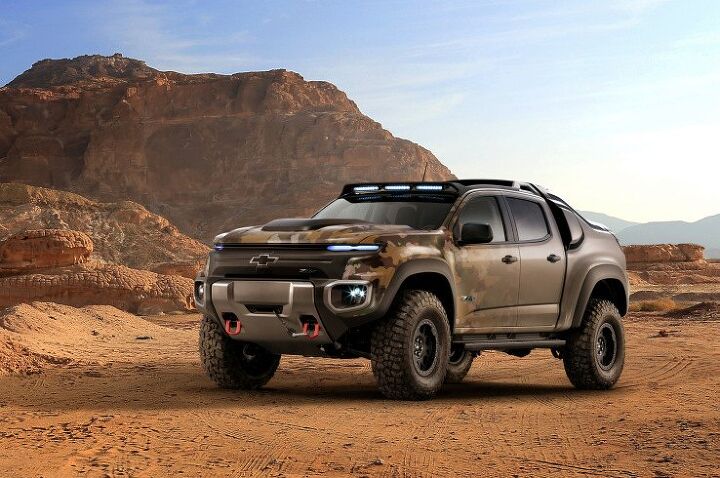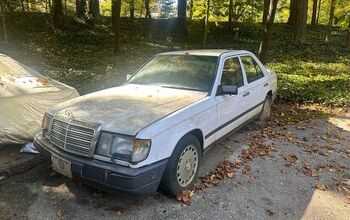Chevrolet Colorado ZH2: Clean, Green, Quiet Warfare Awaits

General Motors has rolled out a unique variant of its popular midsize Chevrolet Colorado pickup in advance of U.S. military trials scheduled to begin next year.
The Colorado ZH2, seemingly plucked from the set of a Mad Max sequel, has seen its frame and body stretched, reinforced and modified to within an inch of its life, and draws its power from a hydrogen fuel cell.
If this sounds like eco-nonsense, and you’re wondering when the U.S. Navy will announce a return to sail, hold on — there are tactical advantages to the vehicle’s powertrain.
Developed in collaboration with the U.S. Army Tank Automotive Research, Development and Engineering Center (TARDEC), the vehicle went from concept to test model within a year. Naturally, GM is quite proud of this.
The U.S. Army takes possession of the vehicle next year, where “extreme field testing” will give a thumbs up or down to the future use of hydrogen vehicles in military operations.
Riding on a lengthened frame, carried by 37-inch tires and a heavily modified suspension, the ZH2 has an immediate drawback. Simply, hydrogen is an incredibly scarce power source, despite being one of the most common elements on earth. Gasoline, diesel, and even electric power is infinitely easier to find, with infrastructure solidly in place.
It’s easy to scoff at the idea of a hydrogen-fueled vehicle waltzing onto a battlefield filled with flying ordnance, or smirk at the supposed benefits of lowering emissions during messy combat operations. The ZH2, however, isn’t taking the place of a main battle tank or light armored vehicle. It’s a specialized tool, with two big advantages: portable power, and near-silent operation.
Under its hood, the ZH2 packs a Exportable Power Take-Off unit (EPTO) that GM says “allows the fuel cell to power activity away from the vehicle, such as remote locations where electric power may otherwise be unavailable.”
To pass the Army’s test, the ZH2 needs to impress in several areas. On the evaluation checklist are: near-silent operation, reduced acoustic and thermal signatures, high wheel torque, low fuel consumption, and water by-product for field use.
For a specialized mission, the ZH2 would presumably tap into a limited reserve of hydrogen at the operating base, then proceed on its relatively quiet foray into the danger zone.
According to Defense One, the vehicle starts off-road testing in January, rotating through Fort Bragg, Fort Benning, and Quantico. Some technical testing will take place in Michigan.
[Image: General Motors]

More by Steph Willems
Latest Car Reviews
Read moreLatest Product Reviews
Read moreRecent Comments
- Jkross22 Sure, but it depends on the price. All EVs cost too much and I'm talking about all costs. Depreciation, lack of public/available/reliable charging, concerns about repairability (H/K). Look at the battering the Mercedes and Ford EV's are taking on depreciation. As another site mentioned in the last few days, cars aren't supposed to depreciate by 40-50% in a year or 2.
- Jkross22 Ford already has an affordable EV. 2 year old Mach-E's are extraordinarily affordable.
- Lou_BC How does the lower case "armada" differ from the upper case "Armada"?
- TMA1 Question no one asked: "What anonymous blob with ugly wheels will the Chinese market like?"BMW designers: "Here's your new 4-series."see also: Lincoln Nautilus
- Ivor Honda with Toyota engine and powertrain would be the perfect choice..we need to dump the turbos n cut. 😀


































Comments
Join the conversation
This looks like something Master Chief would drive.
If they want silent running and low heat signature why not start with a Tesla power pack ?